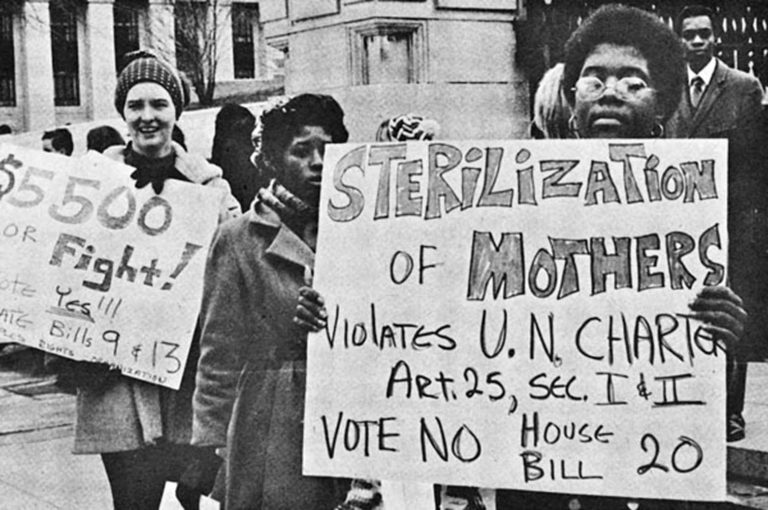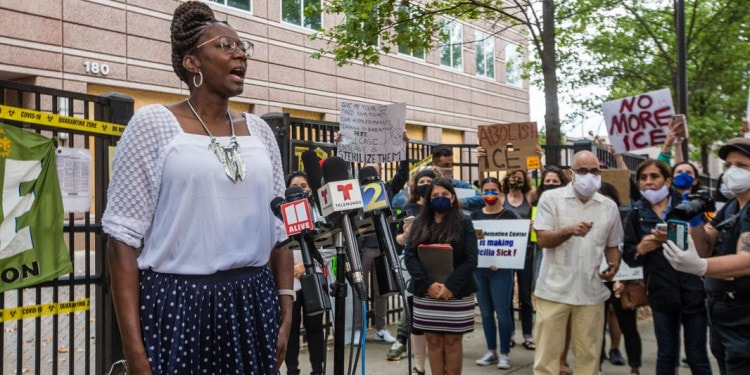Back in September 2020, when the story of Dawn Wooten, a nurse who worked at an immigration detention center in Georgia, broke out, we felt compelled to write an Op-Ed to speak out against forced hysterectomies of ICE detainees. Dawn Wooten had filed what is known as a “whistleblower complaint” about a lack of medical care at the ICE facility that facilitated the spread of COVID-19 and reporting that immigrant women received questionable hysterectomies. More than 40 women, some still detained and others deported, who had been at Irwin County Detention Center filed a class-action lawsuit alleging medical misconduct by ICE doctor Mahendra Amin, a gynecologist accused of performing unnecessary and unwanted medical procedures, including hysterectomies since 2018. In short, what amounts to forced sterilization.
We were grieved, but sadly not surprised as we had been uncovering the true history of reproductive health and coercive behaviors in the United States that disproportionately affected slaves, immigrants, Black, Indigenous, and People of Color (BIPOC).
Many times, stories such as this cycle in and out of the news in a matter of days, only to disappear and become distant memories. When the Op-Ed didn’t get published in a timely manner, we thought we had missed our opportunity to speak out on these horrific and pressing issues. What we’ve come to realize is that forced sterilization and eugenics in the United States is a longstanding problem that deserves to be spotlighted.
Eugenics is a scientific belief centered around the systematic and genetic “cleansing” of the human gene pool, specifically those from the BIPOC populations and people with disabilities or mental health concerns. These efforts are rooted in blatant racism and the attempt to promote reproduction among the “well-born” whilst eliminating the “unfit”.
These ideologies are not just a product of Nazi Germany, they remain ever-present in our tumultuous history, though we’d rather overlook or forget it altogether.
Medical experiments conducted on BIPOC have always been in existence in the United States and they still persist today, it just rarely makes national headlines. That all changed when Dawn Wooten filed her complaint last September and more recently, with the release of the documentary Belly of the Beast, which investigates non-consensual hysterectomies and tubal ligations for incarcerated women in the California Department of Corrections and Rehabilitation.
As reported on NPR in September, Dawn Wooten said in the complaint that “one particular gynecologist, whom she called ‘the uterus collector,’ performs the procedure. ‘Everybody he sees, he’s taking all their uteruses out or he’s taken their tubes out.’”
Forced hysterectomies are just one example of how the cultural cleansing model of Eugenics presents itself today; hence, no more uterus, no more babies. We are taught to blindly listen and accept medical advice and trust in the powers that be without expecting consent, respect, and autonomy over our own bodies.
Related Articles: Black Women Matter | Women Make Their Own Fertility Decisions
The injustices and abuses perpetrated through medical power and privilege are referred to as systemic reproductive coercion.
The hidden histories of reproductive health for women in the United States are disturbing and indescribably violent at best, particularly in the South, ranging from non-consensual, experimental surgeries on enslaved Black women in Alabama in the 1800s to forced hysterectomies in Southern states horrifyingly coined the “Mississippi appendectomy” as recent as the 1980s.

In the early to mid-1900s, 60,000 Americans were forcibly sterilized in relation to eugenics laws in 32 states, including many Latina women, and over 3,000 American Indian women were sterilized without their permission between 1973 and 1976.
The honest truth is that reproductive justice has never fully been achieved for women of color including Black, Indigenous, and immigrant populations.
In 1994, a caucus of Black feminists coined the term “reproductive justice” and repositioned reproductive rights in the context of race, gender, and class. They recognized the need to shift away from the mainstream movement that focused exclusively on abortion-centric rhetoric and to advocate for women who had been targets of sterilization as well as those women who wanted to have children.
At an immigration detention center in Atlanta, GA last September, nurse Dawn Wooten made a brave choice. She has often been called a whistleblower by the press, and that is the technical legal term, but we would rather call her ethical and courageous for challenging the status quo and doing what is socially and morally just.
As academic researchers, we sometimes find it difficult to talk about real-world problems in a simplistic way. Through sharing our own lived-experiences as social workers, mothers, and hearing stories from other women, we discover the power of our voices.
No matter where you stand on the issues of reproductive justice, we hope that we can all agree that removing any human organ without knowledge or consent is indisputably wrong.
About the Authors: Haley H. Beech is a doctoral candidate at the University of Alabama, School of Social Work, and a licensed master social worker. Her research interests include global health social work, maternal health and mortality, intimate partner violence, reproductive justice, cultural humility, and social work education. Amber Sutton (not pictured) is a licensed social worker and Ph.D. student in the School of Social Work at the University of Alabama. Her research focuses on understanding intimate partner violence and maternal health through an intersectional feminist framework. A survivor herself, Sutton is interested in utilizing her practice experience and research to improve responses to survivors. Sutton has served on the Board of Directors for the National Coalition Against Domestic Violence.
Editor’s Note: The opinions expressed here by Impakter.com columnists are their own, not those of Impakter.com. — In the Featured Photo: Dawn Hooten (front left) speaks at a press conference in Atlanta, GA in 2020 after she filed a complaint about conditions at the Irwin County Detention Center. — Featured Photo Credit: Atlanta Journal-Constitution.








